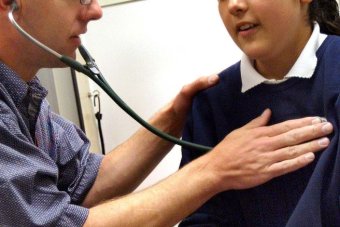
The Victorian Government has fended off claims a new scheme giving students access to doctors at school would allow them to circumvent their parents to get access to medication such as the contraceptive pill.
Under the initiative to begin next year, students at 100 state secondary schools will be able to make an appointment to see a doctor on school grounds one day a week.
Some medical groups, including the Australian Medical Association, are concerned children will be able to access medication like the pill without their parents’ approval.
Education Minister James Merlino refused to confirm whether children will need parental consent to use the program, but said there would be no change to the doctor-patient relationship.
“This is about access to healthcare. This is about providing thousands of Victorian students [with] better access to health care with no cost to the student or their families,” he said.
“The GPs will provide the same health care support for young people that they can access at any GP clinic in Victoria. The only difference will be the GP’s physical location.”
But AMA Victoria president Dr Lorraine Baker said the program needed “considerable policy and operational evaluation” before it was introduced.
She said it had a number of concerns, including whether schools were able to meet requirements for medical supplies, equipment and infection control standards.
“The regulations around medical record integrity and privacy are stringent. The infrastructure to secure these is expensive and the financial model has not been tested,” she said.
Medical association concerned about GP consistency
Dr Baker also questioned whether the same doctor would be available to students to provide continuation of medical care, or if there would be an appropriate system of communication between GPs involved in the child’s care.
“Issues such as alcohol and drug abuse, mental health… and sexual health requires young people to be able to choose the doctor that best suits their needs,” she said.
Mr Merlino said the Government would work with all stakeholders to develop the program further once it was rolled out across the state.
“This is about providing primary health care at the school, delivering better access to health and well-being services, for students and working families that may not have easy access to GPs,” he said.
Dr Baker said the Federal Government’s Medicare rebate freeze would also challenge the viability of the program due to rising fees.
